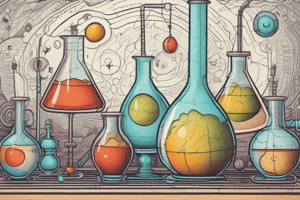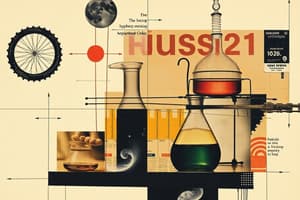Podcast
Questions and Answers
What type of hypothesis is typically stated in a positive manner?
What type of hypothesis is typically stated in a positive manner?
- Confirmatory hypothesis
- Tentative hypothesis
- Null hypothesis (Ho)
- Alternative hypothesis (H1) (correct)
Which step involves collecting information related to the observed problem?
Which step involves collecting information related to the observed problem?
- Analyze
- Experiment
- Research (correct)
- Hypothesize
How is a hypothesis often formulated when making predictions?
How is a hypothesis often formulated when making predictions?
- With descriptive statistics
- By summarizing prior findings
- In an 'IF...THEN...' format (correct)
- Using qualitative analysis
What is a key question to ask when defining your problem during the scientific method?
What is a key question to ask when defining your problem during the scientific method?
What is a valid method to collect information when investigating a problem?
What is a valid method to collect information when investigating a problem?
What is the first step in the scientific method?
What is the first step in the scientific method?
Which step involves formulating an educated guess about how things work?
Which step involves formulating an educated guess about how things work?
What is necessary for designing an experiment in the scientific method?
What is necessary for designing an experiment in the scientific method?
Which of the following is an effective data analysis technique?
Which of the following is an effective data analysis technique?
Which of these is a key component of the analyze phase?
Which of these is a key component of the analyze phase?
What should a good hypothesis allow you to do?
What should a good hypothesis allow you to do?
A hypothesis is solely based on personal beliefs and cannot be tested.
A hypothesis is solely based on personal beliefs and cannot be tested.
What are the key questions to consider when defining your problem in research?
What are the key questions to consider when defining your problem in research?
The two types of hypotheses are the null hypothesis (Ho) and the __________ hypothesis (H1).
The two types of hypotheses are the null hypothesis (Ho) and the __________ hypothesis (H1).
Which method is NOT appropriate for collecting information related to a research problem?
Which method is NOT appropriate for collecting information related to a research problem?
Match the following terms with their definitions:
Match the following terms with their definitions:
Which statement best describes a Null Hypothesis?
Which statement best describes a Null Hypothesis?
Research is only beneficial if it leads to a solution.
Research is only beneficial if it leads to a solution.
What is the typical format used when stating a hypothesis?
What is the typical format used when stating a hypothesis?
An alternative hypothesis may suggest that a variable has an effect on another variable.
An alternative hypothesis may suggest that a variable has an effect on another variable.
Give an example of a Null Hypothesis.
Give an example of a Null Hypothesis.
Which of the following accurately describes the final step of the scientific method?
Which of the following accurately describes the final step of the scientific method?
The scientific method is only applicable to biological sciences.
The scientific method is only applicable to biological sciences.
A good hypothesis should be _____, _____, and _____.
A good hypothesis should be _____, _____, and _____.
Match the type of hypothesis to its correct definition:
Match the type of hypothesis to its correct definition:
What is the purpose of conducting research in the scientific method?
What is the purpose of conducting research in the scientific method?
Which of the following is a quality of a good hypothesis?
Which of the following is a quality of a good hypothesis?
In the scientific method, the step where you identify a problem is called __________.
In the scientific method, the step where you identify a problem is called __________.
Match the steps of the scientific method with their descriptions:
Match the steps of the scientific method with their descriptions:
There can be a right or wrong hypothesis.
There can be a right or wrong hypothesis.
What is the purpose of formulating a hypothesis in research?
What is the purpose of formulating a hypothesis in research?
What is the primary role of experimenting in the scientific method?
What is the primary role of experimenting in the scientific method?
Drawing conclusions in the scientific method should be based solely on assumptions.
Drawing conclusions in the scientific method should be based solely on assumptions.
Which variable is manipulated in an experiment?
Which variable is manipulated in an experiment?
What key factors should be considered when designing an experiment?
What key factors should be considered when designing an experiment?
The dependent variable is what is changed in an experiment.
The dependent variable is what is changed in an experiment.
What should you do if your experimental results do not match your hypothesis?
What should you do if your experimental results do not match your hypothesis?
The _____ variable is the outcome measured in an experiment.
The _____ variable is the outcome measured in an experiment.
Match the type of variable with its definition:
Match the type of variable with its definition:
Which of the following actions is recommended for future researchers based on your findings?
Which of the following actions is recommended for future researchers based on your findings?
Communicating results is a critical step in completing a scientific activity.
Communicating results is a critical step in completing a scientific activity.
What is an example of a controlled variable in an experiment?
What is an example of a controlled variable in an experiment?
Inference refers solely to objective conclusions drawn from observations.
Inference refers solely to objective conclusions drawn from observations.
What is an example of quantitative data related to a friend?
What is an example of quantitative data related to a friend?
Match the following descriptions with their corresponding types of data:
Match the following descriptions with their corresponding types of data:
Which of the following is a form of qualitative data?
Which of the following is a form of qualitative data?
Flashcards are hidden until you start studying
Study Notes
Scientific Method
- A structured approach scientists use to test hypotheses and differentiate truth from myths and superstitions.
- A systematic method of exploring observations, answering questions, and solving problems.
- Involves observation, problem identification, gathering information, formulating hypotheses, designing and conducting experiments, recording and analyzing data, and drawing conclusions.
Steps of the Scientific Method
- Observe:
- Identify a problem or phenomenon that sparks curiosity.
- Frame questions related to your observation: How, What, When, Who, Which, Why, or Where?
- Example questions:
- How does water purity affect surface tension?
- When is the best time to sleep?
- How does arch curvature affect load carrying strength?
- What is the favorite subject of grade 6?
- Research:
- Gather information related to the problem.
- Review existing records, data, or consult experts.
- Conduct interviews, research books, articles, online sources, or consult with authorities in the area.
- Helps develop a deeper understanding of the problem.
- Hypothesize:
- Formulate an educated guess about how things work or the factors that affect the problem.
- A testable explanation for a set of observations.
- Often written in an "IF...THEN..." format.
- Examples:
- If water purity is increased, then surface tension will decrease.
- If arch curvature is increased, then load carrying strength will increase.
- Test:
- Design an experiment to test the hypothesis.
- Identify the treatment variable (independent variable) that will be manipulated.
- Observe and record all details that occur when the treatment variable is changed.
- May include control groups for comparison.
- Repeat the experiment several times for accuracy.
- Analyze:
- Organize and present data in tables or graphs.
- Visualize the results to understand the data and findings.
- Look for patterns or relationships in the data.
- Conclude:
- Draw conclusions based on the analysis of the data.
- Determine if the results support or refute the hypothesis.
- Accept or reject the hypothesis based on the evidence.
- Accepting the hypothesis: Provide recommendations for further study and share any difficulties encountered.
- Rejecting the hypothesis: Accept the alternative hypothesis and recommend solutions to the problem.
- Share findings and conclusions in a clear and concise manner.
Designing an Experiment
- Key Questions to Consider:
- How will I test my hypothesis?
- What materials are needed?
- What data needs to be collected?
- How will data be collected?
- Do I need a control group for comparison?
- How will I plan my time?
- How many samples and tests are needed?
- How will I organize and summarize the data?
- Will I use graphs, tables, or charts?
- Can I see patterns or relationships in my data?
- Do my results answer my original questions?
- Are my findings useful to others?
Importance of the Scientific Method
- Provides a structured approach to solving problems.
- Helps to eliminate bias and ensure accuracy in findings.
- Enables the replication of experiments and the validation of results.
- Contributes to the advancement of knowledge and understanding.
The Scientific Method
- A sequence of steps scientists use to test hypotheses and differentiate truth from myths and superstitions.
- Used to explore observations and answer questions
- Provides a systematic way to generate information based on observation, experimentation, and inference.
- Steps include:
- Observation
- Problem identification
- Gathering information
- Formulating a hypothesis
- Designing and performing experiments
- Recording and analyzing data
- Drawing conclusions
Observation
- Identifying a problem and asking a question about something you observe
- Questions should explore the "how," "what," "when," "who," "which," "why," or "where" of the observation.
- Consider what you want to know and expect to find out through the investigation.
Research
- Investigate and collect information related to the problem.
- Review existing records, data, and consult experts.
- It is crucial to understand what is already known about the topic.
- Examples:
- Interviewing officials or authorities in a specific community
- Researching in books, online articles, journals, and other resources.
Hypothesize
- An educated guess about how things work or the factors that affect the problem.
- It aims to answer your question with an explanation that can be tested.
- A hypothesis is a tentative explanation for a set of observations.
- Some statements use the "IF" ... "THEN" ... format, which permits testability.
- Two types of hypothesis:
- Null Hypothesis (Ho): A statement indicating there is no relationship between two population parameters. Written in negative terms.
- Example: Earthworms do not help improve the quality of soil.
- Alternative Hypothesis (H1): A statement suggesting a correlation or relationship between variables in a study. Written in affirmative terms.
- Example: Earthworms help improve the quality of soil.
- Null Hypothesis (Ho): A statement indicating there is no relationship between two population parameters. Written in negative terms.
Qualities of a Good Hypothesis
- Observable: Conditions should be easily observed.
- Example: If fertilizer affects the growth of plants, then adding fertilizer to the soil will make the plant grow taller than the plants without fertilizer.
- Measurable: The hypothesis should have conditions that can be easily measured.
- Testable: The hypothesis should be one that can be subjected to experimentation.
- Since a hypothesis is an educated guess, there is no right or wrong hypothesis. Experiments support or refute the hypothesis.
Testing a Hypothesis
- Design an experiment, gather the necessary materials, and identify the treatment to be compared with a control.
- Identify the variable being manipulated.
Analyze
- Organize and present data in tables or graphs.
- Visualizing results helps understand the data and its implications.
Conclusion
- Interpret the findings and draw conclusions based on the data.
- Determine whether the conclusion supports or refutes the hypothesis.
- If the conclusion supports the hypothesis, accept it and provide recommendations for further study.
- If the conclusion refutes the hypothesis, reject it and accept the counterpart hypothesis.
Communicating Results
- Complete the science activity by sharing results through a final report, display board, or presentation.
- Professional scientists publish final reports in scientific journals or present their findings at scientific meetings.
Variables
- Controlled Variable: Kept constant throughout the experiment.
- Example: Size of dishes used, number of mungo beans, amount of water.
- Dependent Variable: Responding variable that represents the effect or the outcome.
- Example: Plant height.
- Independent Variable: The variable you are changing and manipulating. The cause.
- Example: Light.
Independent Variable
- A variable that does not depend on any other variables within the experiment.
- Also known as "explanatory," "manipulated," or "controlled" variables.
- Example: Jupiter is the biggest planet of them all. (This statement is independent of any other variable about planets.)
Dependent Variable
- A variable that depends on other variables within the experiment.
- Also known as "measured," "responding," or "explained" variables.
- Example: Saturn is composed of hydrogen and helium. (This statement depends on knowing that Saturn is a planet.)
Qualitative and Quantitative Data
- Quantitative data: Numerical data that can be measured.
- Example: "My best friend is 5 feet 7 inches tall" "They have size 6 feet." "They weigh 63 kg" "My best friend has two cats."
- Qualitative data: Descriptive data that is not easily measured.
- Example: "My best friend has curly brown hair." "They have green eyes." "They are funny, loud, and a good listener." "They have a very friendly face and a contagious laugh."
Studying That Suits You
Use AI to generate personalized quizzes and flashcards to suit your learning preferences.





